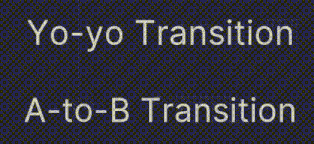- Unity User Manual 2023.1 (beta)
- User interface (UI)
- UI Toolkit
- Control behavior with events
- Event examples
- Create looping transitions
Create looping transitions
Version: 2022.1+
This example demonstrates how to leverage the TransitionEndEvent to create transitions that loop.
Example overview
This example demonstrates two looping animations:
- Yo-yo: The loop starts from state A to state B with transition, and then return back to state A with transition.
- A-to-B: The loop starts from state A to state B with transition, and then return back to state A without transition.

You can find the completed files that this example creates in this GitHub repository.
要件
This guide is for developers familiar with the Unity Editor, UI Toolkit, and C# scripting. Before you start, get familiar with the following:
Create the example
Create a project in Unity with any template.
In your Project window, create a folder named
loop-transition-example.Right-click in the folder, and select Create > UI Toolkit > Editor Window.
In the UI Toolkit Editor Window Creator window, enter
LoopingExample.Save your changes. This creates three files as
LoopingExample.cs,LoopingExample.uss, andLoopingExample.uxml.-
Replace
LoopingExample.cswith the following content:using UnityEditor; using UnityEngine; using UnityEngine.UIElements; public class LoopingExample : EditorWindow { [SerializeField] private VisualTreeAsset m_VisualTreeAsset = default; private Label _yoyoLabel; private Label _a2bLabel; [MenuItem("Window/UI Toolkit/Transition Looping Example")] public static void ShowExample() { var wnd = GetWindow<LoopingExample>(); wnd.titleContent = new GUIContent("TransitionStyle"); } public void CreateGUI() { VisualElement root = rootVisualElement; VisualElement asset = m_VisualTreeAsset.Instantiate(); root.Add(asset); SetupYoyo(root); SetupA2B(root); } // This method powers the yo-yo loop. private void SetupYoyo(VisualElement root) { _yoyoLabel = root.Q<Label>(name: "yoyo-label"); // When the animation ends, the callback toggles a class to set the scale to 1.3 // or back to 1.0 when it's removed. _yoyoLabel.RegisterCallback<TransitionEndEvent>(evt => _yoyoLabel.ToggleInClassList("enlarge-scale-yoyo")); // Schedule the first transition 100 milliseconds after the root.schedule.Execute method is called. root.schedule.Execute(() => _yoyoLabel.ToggleInClassList("enlarge-scale-yoyo")).StartingIn(100); } // This method powers the A-to-B cycle. private void SetupA2B(VisualElement root) { _a2bLabel = root.Q<Label>(name:"a2b-label"); _a2bLabel.RegisterCallback<TransitionEndEvent>(evt => { _a2bLabel.RemoveFromClassList("enlarge-scale-a2b"); _a2bLabel.schedule.Execute(() => _a2bLabel.AddToClassList("enlarge-scale-a2b")).StartingIn(10); }); _a2bLabel.schedule.Execute(() => _a2bLabel.AddToClassList("enlarge-scale-a2b")).StartingIn(100); } } -
Replace
LoopingExample.uxmlwith the following content:<ui:UXML xmlns:ui="UnityEngine.UIElements" xmlns:uie="UnityEditor.UIElements" xsi="http://www.w3.org/2001/XMLSchema-instance" engine="UnityEngine.UIElements" editor="UnityEditor.UIElements" noNamespaceSchemaLocation="../../../../UIElementsSchema/UIElements.xsd" editor-extension-mode="False"> <Style src="LoopingExample.uss" /> <ui:VisualElement name="container"> <ui:VisualElement> <ui:Label text="Yo-yo Transition" name="yoyo-label" class="text-style" /> </ui:VisualElement> <ui:VisualElement> <ui:Label text="A-to-B Transition" name="a2b-label" class="text-style"/> </ui:VisualElement> </ui:VisualElement> </ui:UXML> -
Replace
LoopingExample.usswith the following content:#yoyo-label{ transition-duration: 3s; } .text-style { font-size: 20px; flex-grow: 0; margin: 20px; } .enlarge-scale-a2b{ scale: 1.5 1.5; transition-duration: 3s; } .enlarge-scale-yoyo{ scale: 1.5 1.5; } #container{ flex-grow:1; justify-content: space-around; align-items: center; } To test the example, from the menu, select Window -> UI Toolkit -> Transition Looping Example.